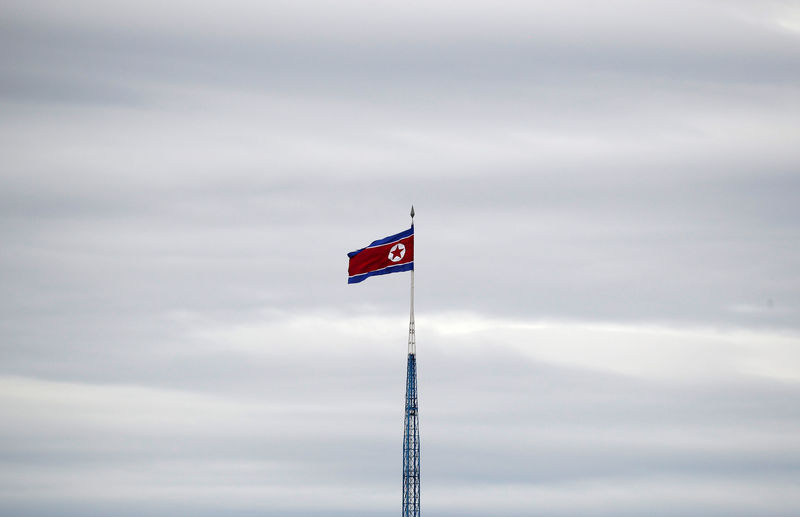By Hyonhee Shin
SEOUL (Reuters) - Impoverished North Korea is suffering its worst drought in decades and food supplies are reportedly running low, but South Korea's push to provide aid is bogged down in the growing tension marked by missile tests and sanctions crackdowns.
South Korea is seeking to send food directly to the North while scaling up donations to international agencies including the U.N. World Food Programme (WFP), two sources familiar with the matter told Reuters.
If it comes off, it would mark the South's first bilateral food aid since 2010, when it delivered 5,000 tons of rice, Unification Ministry data shows.
The WFP says more than 10 million North Koreans are in urgent need after crop output plunged to a decade low last year. On Monday, the Red Cross said this year's early drought is threatening the summer harvest, adding to the crisis.
A devastating famine in the 1990s, exacerbated by drought, killed as many as a million North Koreans, with many resorting to eating tree bark and grass.
The North's official KCNA news agency on Wednesday said this year's rainfall so far was the lowest since 1982, while the Rodong Sinmun newspaper called for staging "war against the nature", mobilizing all available water pumps and irrigation equipment.
But tension again has mounted since a second summit between North Korean leader Kim Jong Un and U.S. President Donald Trump, aimed at bringing about the denuclearization of the North, broke down in Hanoi in February.
The North has fired two missiles and multiple projectiles in recent weeks, in what South Korean President Moon Jae-in called a calibrated protest against Washington.
Moon said Trump supported his aid plan, but after promising to ease hurdles for humanitarian aid earlier this year, U.S. officials remain half-hearted, especially in light of the recent weapons tests, blaming the North Korean regime for the food shortages.
Moon's administration, whose 2017 push for $8 million aid to U.N. agencies fell apart amid flaring tensions, is adamant about implementing its latest commitment, but it's unclear when and how that plan will materialize, according to the sources who spoke on anonymity due to the sensitivity of the topic.
"They'll try their best to make it happen, but nothing has been decided. There is a lot more to consider than two years ago," one of the sources said.
'SENSE OF CRISIS'
The source said there was a "sense of crisis" brewing within the administration ahead of a key parliamentary election next year amid the stalled nuclear talks and lackluster progress in inter-Korean initiatives.
The dramatic detente between the two Koreas has propped up Moon's approval ratings, which were hit by a stagnating economy and jobs crunch and then fell to their lowest levels after the Hanoi summit.
Moon said the aid would not only help needy North Koreans but also reduce his government's excessive rice stockpile and break the nuclear standoff between Pyongyang and Washington.
About 45 percent of South Koreans support humanitarian aid to the North, according to a study released on Monday by the state-run Korea Institute for National Unification.
But the North's Maeri propaganda website brushed off the South's aid plan as "empty words" and "far-fetched mockery".
Early this year, South Korea offered to provide flu medication, but its delivery was delayed amid consultations with the United States and the North eventually refused to take it.
Rice has also historically been a sensitive item, along with cement and fertilisers, due to concerns that Pyongyang may divert any outside handouts to bankroll its weapons programs.
"The situation is extremely sensitive," another source said. "If the two-track approach proves unfeasible, we would just have to go through the international organizations."
Some observers, including Lee Hye-hoon, head of the parliamentary intelligence committee, said the situation may not be as tough as aid groups say.
Data compiled by Daily NK, a defector-run website, showed rice prices have dropped about 15% since November, suggesting the shortages may not be as bad as some people think.
But Seoul's Unification Ministry said it sees data from the WFP and other U.N. agencies as more "official and objective."
"It's difficult to know just how bad the situation really is," said Peter Ward, a scholar who researches North Korea's economy, citing the lack of credible information.

"It doesn't look like we are headed for another famine, but the food situation definitely appears to have deteriorated."